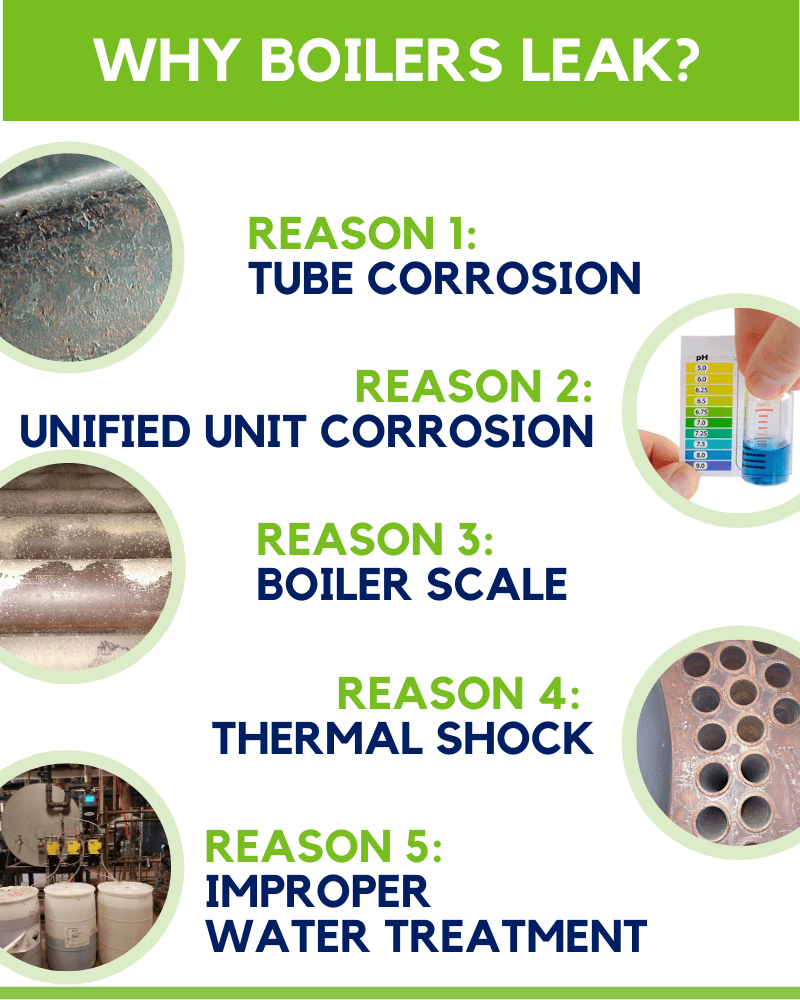Boiler Tube Leaks – What is the Cause? Top 5 Reasons and More
Is Your Boiler Leaking? Here’s What You Need to Know
Boiler tube leaks are one of the most common boiler system failures, leading to costly inefficiencies, increased maintenance costs, and even complete system failure if left unchecked. Addressing boiler leaks early through proper water treatment and maintenance can prevent major repair costs and keep your system running efficiently.
What to Do If You Discover a Leaked Tube in Your Boiler
A leaked tube in a boiler system is a serious issue that requires immediate attention. Even a small leak can lead to significant heat loss, reduced system pressure, and long-term damage if not addressed quickly. In many cases, a tube leak is a symptom of deeper water chemistry or maintenance problems, such as corrosion, scale buildup, or improper water treatment.
At ChemREADY, we help companies mitigate boiler tube leaks with advanced water treatment solutions designed to protect boiler systems from corrosion, scale buildup, and thermal shock.
Top 5 Causes of Boiler Tube Leaks
While leaks can occur for a variety of reasons, the main culprits behind boiler tube failures are:
- Tube Corrosion
- Unified Unit Corrosion
- Boiler Scale Build-Up
- Thermal Shock
- Improper Boiler Water Treatment
Understanding these causes and implementing preventative maintenance measures can extend the lifespan of your boiler system while ensuring operational efficiency.
Plant managers and engineers plan for proper treatment to keep their water boilers up and running!
Learn more about Boiler Water Treatment Preventative Maintenance BMP’s
1. Tube Corrosion: The Leading Cause of Boiler Leaks
Corrosion is one of the most direct and costly causes of boiler tube failures. The primary form of corrosion affecting boiler tubes is oxygen pitting, which occurs when excess oxygen in the boiler water reacts with metal components, leading to corrosion.
How to Prevent Boiler Tube Corrosion
- Maintain higher feedwater temperatures to reduce oxygen levels.
- Use oxygen scavengers such as ChemREADY’s Boiler Deoxy, which contains sulfite or bisulfite ions to remove excess oxygen.
- Implement a routine water treatment plan to monitor and manage corrosion risks effectively.
2. Unified Unit Corrosion: When Corrosion Affects the Entire System
Beyond localized tube corrosion, entire boiler systems can suffer from widespread corrosion due to low pH levels.
How Low pH Causes Corrosion
- pH below 8 increases water acidity, accelerating metal deterioration.
- Even a neutral pH of 7 is risky, as minor fluctuations can push the system into acidic conditions.
How to Prevent Unified Unit Corrosion
- Maintain pH levels above 10 for optimal corrosion control.
- Use pH and alkalinity adjusters like ChemREADY’s Boiler pH, designed to stabilize and maintain pH levels.
3. Boiler Scale: The Hidden Danger Inside Your Boiler
Scale buildup reduces heat transfer efficiency, leading to increased pressure, higher energy costs, and tube leaks. Additionally, scale can clog critical components such as blowdown and pressure release valves.
How to Prevent Boiler Scale Buildup
- Use chemical softeners and scale inhibitors like BOILER DESCALE to solubilize contaminants in boiler feedwater.
- Implement a regular blowdown schedule to remove suspended solids and scale deposits.
4. Thermal Shock: Preventing Damage from Rapid Temperature Changes
When cold water is introduced into a hot boiler, the sudden temperature difference causes the metal to expand and contract rapidly, leading to cracks and tube leaks.
How to Prevent Thermal Shock
- Ensure that boiler feedwater is properly preheated before introduction into the boiler.
- Maintain a consistent operating temperature to avoid sudden fluctuations.
5. Improper Boiler Water Treatment: The Most Costly Mistake
A common but avoidable cause of boiler leaks is neglecting post-installation water treatment. Without proper treatment, boilers experience rapid corrosion, scale buildup, and premature failure.
The Cost of Untreated Water in Boilers
- Increased corrosion leading to early tube failure.
- Higher maintenance costs due to scale deposits.
- Reduced boiler efficiency, increasing operating expenses.
How to Implement Proper Boiler Water Treatment
- Use water treatment solutions like ChemREADY’s Boiler Water Treatment Program to ensure long-term boiler health.
- Schedule regular water quality testing to catch potential issues early.
The ChemREADY Advantage: Keeping Your Boiler Running at Peak Efficiency
At ChemREADY, we provide industry-leading boiler treatment solutions that help prevent leaks, reduce scale buildup, and optimize system efficiency. Our services include:
✅ Site Surveys to assess boiler water treatment needs
✅ Total Service Management for ongoing maintenance
✅ Supervisory Programs with or without chemicals
✅ Custom Water Treatment Solutions for commercial and industrial applications
Learn More: ChemREADY’s Boiler Water Treatment Services
FAQs About Boiler Tube Leaks
1. What causes boiler tube leaks?
Boiler tube leaks are mainly caused by corrosion, scale buildup, thermal shock, and improper water treatment.
2. How can I prevent boiler corrosion?
Use oxygen scavengers like ChemREADY’s Boiler Deoxy, maintain proper pH levels, and implement routine water treatment.
3. What’s the best way to remove scale from my boiler?
Use BOILER DESCALE chemicals, schedule regular blowdowns, and maintain proper water chemistry to prevent scale buildup.
4. Why is pH important in boiler water treatment?
pH levels below 8 increase acidity and corrosion, while maintaining pH above 10 protects against unified corrosion.
5. How does ChemREADY help prevent boiler leaks?
We provide site surveys, customized water treatment solutions, and preventive maintenance programs to ensure boiler longevity and efficiency.
About The Author
Nick Piskura is the Marketing and Web Development Specialist at ChemREADY who utilizes expertise in digital marketing strategies to provide knowledgeable insights in each segment of our business. Nick provides insights through web development and multimedia resources that support ChemREADY’s full range of services, including Legionella management, ANSI/AAMI ST108 compliance, boiler and cooling tower treatment, wastewater processing, and industrial water quality solutions.


